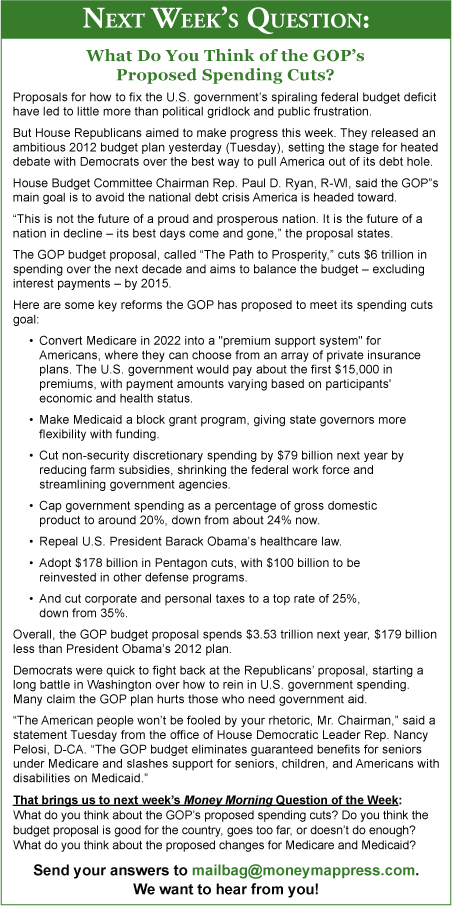Washington for months has been tangled in a messy political debate over the 2011 federal budget. The newest deadline to reach a budget deal - April 8 - is just a couple of days away.
The phrase "government shutdown" is being used with increasing frequency.
Temporary funding measures have kept the government running this year as U.S. lawmakers repeatedly extended the final budget deadline. An end to negotiations is still nowhere in sight - stoking the shutdown discussions.
While the thought of a Capitol Hill ghost town has a certain allure, federal budget expert Stan Collender says most Americans would find little to joke about in the face of a real shutdown.
"Everybody may hate federal spending, but they like federal services," Collender told NPR. "And that's what happened back in '95 and '96 when we had the last two shutdowns. Within minutes...after everyone got over the initial kind of amusement of the situation, they realized suddenly that they couldn't apply for a passport, couldn't apply for a visa, and national parks were closed. Government contractors suddenly found out there was no one there to review their proposals or process their checks - and they were angry as hell about it."
A U.S. government shutdown means running essential operations only. National parks and museums close, cleanup at toxic waste sites stops, passport applications and Social Security claims go unprocessed, and hundreds of thousands of federal employees and government contractors go without pay.
When asked last Tuesday to rank the odds of a U.S. government shutdown on a scale of one (shutdown) to 10 (no shutdown), House Minority Whip Rep. Steny Hoyer, D-MD, said, "I would've said 'eight' two weeks ago. At this point in time, I'll tell you five to six."
Republicans and Democrats both have developed budget plans - with a $51 billion difference in the proposed spending cuts. Both parties are hesitant to compromise, but more than willing to point fingers at each other for delaying the process.

"One thing about a government shutdown, the government doesn't stop taking money out of your paycheck every Friday," Rep. Robert Andrews, D-NJ, told NPR. "People still pay taxes, but they get no services. How anybody could put the country at risk of that situation is beyond me."
While some anxiously await the deadline, others think the U.S. government will continue to delay a final decision until it runs into more problems - like next year's budget and the approaching debt limit.
"My guess is we end up with another short-term resolution taking it to, say, 4/29," said Money Morning Contributing Editor Martin Hutchinson. "After that, it's tied up with the 2012 budget and the debt ceiling, in both of which the GOP House has rather more leverage. My guess would be a fair number of threats and mock-crises in May, followed by an overall agreement on a giant package involving only modest cuts in early June, just before the government finally runs out of the ability to borrow."

This prompted last week's Money Morning "Question of the Week": Do you think we are headed for a U.S. government shutdown? Do you think the parties will reach a budget agreement, or continue with temporary funding measures? How would you be affected by a government shutdown?
Readers sent in the following comments on what the possible looming government shutdown means for the country.
"I'm Not a Pessimist - I'm a Historian"
It seems likely to me that we are headed for a government shutdown, because there are enough people on opposite sides of the debate who figure that they could spin such a shutdown to their benefit. The effects on the "little people" don't really matter to such, only whether or not such a move will help their re-election efforts.
In a larger sense, though, we are headed for a government crisis, as our financial situation will blow up or collapse at some point. A shutdown on April 8 would be a minor and easily reversed inconvenience for the United States. A sudden rise of several percentage points in interest rates, or an acceleration of real inflation by the same amount, or both, would have a far more catastrophic effect on the nation, and I don't see how we can avoid both of these for much longer. We will get one or the other, and we may get both.
This would not result directly in a U.S. government shutdown, but when it becomes evident to everyone that the government is impotent to deal with the problems that it has created, and everyone is hurting and angry, the situation will be far more serious than a simple shutdown in the near term. My real fear is that by the time the crisis becomes real and evident, it will be too late to make real changes to fix it. But now, when we may still have a small window of opportunity to make a difference, our politicians are threatening to shut down the government over annual cuts that would not cover two weeks of our deficit.
The saddest part about the whole thing is that whatever compromises are made (to either avoid a shutdown or to pass a budget and get the government going again) are likely to make the long-term problems worse. Sorry to sound so negative, but as a co-worker of mine used to say, "I'm not a pessimist - I'm an historian!"
- Gordon F.
Wasted Money on Wages
We have too many politicians lining their personal pockets with our money, politicians who give themselves a raise while we pay for their high wages. Then when the budget can't be balanced, they threaten us with shutting down things that do not need to be shut down.
If only the American people will say enough and demand our fat cats in government to cut their wages instead of criticalservices that the American people want. Wake up America! We have been asleep at the wheel way too long!
Maybe the government should shut down so things can finally change. Has to get bad before it can get better.
I love my country (America) so very much! But I have had it with wasted money on rich politicians and pork barrel spending.
- Kirk M.
Bring It On
I say bring it on. Give the economy a breather without Washington trying to micro-manage every detail of our lives. Other countries have somehow managed to go months without a "government." Italy and Belgium come to mind. Just think of all the money we could save in two weeks if Congress and the White House could not use their debit cards!
- Jay
Keep 'Em Shut
'
Hooray! What can we do to make this happen? If non-essential services can be "shut-down" let's keep them "shut-down."
- M.S., Mississippi
I wish it would shut down forever!
- Holly J.
Be sure to answer next week's question: What do you think about the GOP's proposed spending cuts? Do you think the budget proposal is good for the country, goes too far, or doesn't do enough? What do you think about the proposed changes for Medicare and Medicaid?
Send your answers to [email protected].!
Is there a topic you want to see covered as a "Question of the Week" feature? Then let us know by e-mailing Money Morning at [email protected]. Make sure to reference "question of the week suggestion" in the subject line. We reserve the right to edit responses for length, grammar and clarity.
Thanks to everyone who took the time to participate - via e-mail or by posting their comments directly on the Money Morning Web site.]
News and Related Story Links:
- Money Morning:
Washington's Debt-Ceiling Debate - A Political Sham - NPR:
Analysts Say A Government Shutdown Is No Joke - The Wall Street Journal:
Government Shutdown Grows Likelier - CNNMoney.com:
Government shutdown: What's at stake - Money Morning News Archive:
Question of the Week Feature


